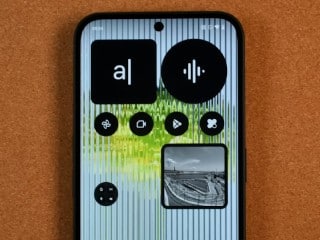Google One: Photos Features, Storage Plans, VPN Service, and Everything Else You Need to Know
Google Photos unlimited storage benefit is ending next year to lure more users to Google One subscription.

Google One storage plans in India are priced starting at Rs. 130 per month
Google One is a paid subscription storage model offered by Google, and with unlimited free storage on Google Photos now announced to be coming to an end, it's something that people are going to have to explore more. It was launched in 2018 in the US first, and was later brought to many other countries, including India. Google One is essentially the tech giant's counter to Apple's iCloud and it offers features like additional storage, family sharing, and much more. Google has also introduced new features for premium Google One members recently, including a VPN service for Android users in the US.
Here's a guide on what Google One offers, all the new features that have been introduced, and everything else that you need to know about it.
Google One storage plans price in India, US
In India, Google One membership plans are priced at Rs. 130 per month (Rs. 1,300 for a year) for 100GB storage, Rs. 210 per month (Rs. 2,100 for a year) for 200GB storage, Rs. 650 per month (Rs. 6,500 for a year) for 2TB of storage, Rs. 3,250 per month for 10TB of storage, Rs. 6,500 per month for 20TB of storage, and Rs. 9,750 per month for 30TB of storage. The Google One app offers comprehensive breakup of your storage, and the amount of space used. Users get 15GB of free data, after which they will need to buy a Google One subscription to continue saving data to the cloud.
In the US, Google One membership is priced at $1.99 per month ($19.99 per year) for 100GB storage, $2.99 per month ($29.99 for the year) for 200GB, $9.99 per month ($99.99 yearly) for 2TB, $99.99 per month for 10TB, and $199.99 per month for 20TB, and $299.99 for 30TB of storage.
| Storage Tier | India Price | US Price |
| 100GB | Rs. 130 per month Rs. 1,00 per year | $1.99 per month $19.99 per year |
| 200GB | Rs. 210 per month Rs. 2,100 per year | $2.99 per month $29.99 per year |
| 2TB | Rs. 650 per month Rs. 6,500 per year | $9.99 per month $99.99 per year |
| 10TB | Rs. 3,250 per month | $99.99 per month |
| 20TB | Rs. 6,500 per month | $199.99 per month |
| 30TB | Rs. 9,750 per month | $299.99 per month |
Google One membership key features
Google One is a paid membership plan that offers users expanded storage benefits – which covers Google Drive, Gmail, and Google Photos. It also offers the ability to automatically back up your phone for ease in switching handsets, and helps in getting with experts easily for better complaint redressal. It also offers access to Google Store rewards and Google Play credits. Users can share their Google One plan with up to five family members and get extended free trials on services like YouTube Premium.
Google Photos unlimited storage ending 2021
Recently, Google announced that it is ending free unlimited storage benefit in Google Photos and will start charging for the storage space your photos and videos take over the 15GB quota. The new change will come into effect on June 1, 2021. This move is aimed to help convince more people to get a paid Google One subscription.
The company mentions that any photos or videos you've uploaded in ‘high quality' (not original quality) before June 1 will not count against the 15GB cap. Thus, the change will be effective for uploads taking place after June 1. Furthermore, old Pixel phone users will be exempted from the latest change and will continue to be able to upload their photos and videos in ‘high quality' from their devices even after June 1. But unlike before, they will also not be able to access unlimited storage for their content in its original file size. Future Pixel phones have been confirmed to not offer unlimited storage benefit.
Google One to offer paid editing tools in Google Photos
Google is also reportedly adding several paid editing tools in Photos for Google One paid subscribers exclusively. For instance, it is offering a paid colour pop feature to Google One members whereing they can apply the filter on any photo – even without depth information. Currently, the feature is available for free only for photos with depth information.
VPN Service for Premium Google One subscribers
Last month, Google also introduced a VPN service for specific Google One subscribers. The VPN by Google One is only available on 2TB and higher plans. A virtual private network (VPN) is designed for secure Internet usage and is used by individuals to access barred sites. With its VPN app, Google adds secure encryptions on a phone's online traffic, no matter what app or browser the user may be using. The service has launched for Android users in the US initially, but it plans to expand to more countries and to iOS, Windows, and macOS in the coming months.
Is Android One holding back Nokia smartphones in India? We discussed this on Orbital, our weekly technology podcast, which you can subscribe to via Apple Podcasts, Google Podcasts, or RSS, download the episode, or just hit the play button below.
Get your daily dose of tech news, reviews, and insights, in under 80 characters on Gadgets 360 Turbo. Connect with fellow tech lovers on our Forum. Follow us on X, Facebook, WhatsApp, Threads and Google News for instant updates. Catch all the action on our YouTube channel.
Related Stories
- Samsung Galaxy Unpacked 2026
- iPhone 17 Pro Max
- ChatGPT
- iOS 26
- Laptop Under 50000
- Smartwatch Under 10000
- Apple Vision Pro
- Oneplus 12
- OnePlus Nord CE 3 Lite 5G
- iPhone 13
- Xiaomi 14 Pro
- Oppo Find N3
- Tecno Spark Go (2023)
- Realme V30
- Best Phones Under 25000
- Samsung Galaxy S24 Series
- Cryptocurrency
- iQoo 12
- Samsung Galaxy S24 Ultra
- Giottus
- Samsung Galaxy Z Flip 5
- Apple 'Scary Fast'
- Housefull 5
- GoPro Hero 12 Black Review
- Invincible Season 2
- JioGlass
- HD Ready TV
- Latest Mobile Phones
- Compare Phones
- Tecno Pova Curve 2 5G
- Lava Yuva Star 3
- Honor X6d
- OPPO K14x 5G
- Samsung Galaxy F70e 5G
- iQOO 15 Ultra
- OPPO A6v 5G
- OPPO A6i+ 5G
- Asus Vivobook 16 (M1605NAQ)
- Asus Vivobook 15 (2026)
- Brave Ark 2-in-1
- Black Shark Gaming Tablet
- boAt Chrome Iris
- HMD Watch P1
- Haier H5E Series
- Acerpure Nitro Z Series 100-inch QLED TV
- Asus ROG Ally
- Nintendo Switch Lite
- Haier 1.6 Ton 5 Star Inverter Split AC (HSU19G-MZAID5BN-INV)
- Haier 1.6 Ton 5 Star Inverter Split AC (HSU19G-MZAIM5BN-INV)







![[Partner Content] OPPO Reno15 Series: AI Portrait Camera, Popout and First Compact Reno](https://www.gadgets360.com/static/mobile/images/spacer.png)









